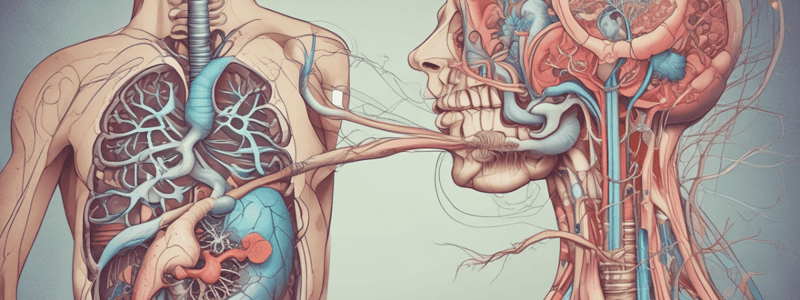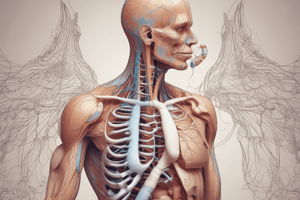Podcast
Questions and Answers
What is the primary mechanism responsible for ventilation?
What is the primary mechanism responsible for ventilation?
- Peristalsis of the esophagus
- Movement of the diaphragm and intercostal muscles (correct)
- Contraction and relaxation of the heart
- Expansion and contraction of the rib cage
What happens during the process of ventilation?
What happens during the process of ventilation?
- The lungs remain stationary and the rib cage contracts
- The lungs empty and the diaphragm ascends
- The lungs shrink and the diaphragm descends
- The lungs fill with air and the diaphragm descends (correct)
What is the result of the movement of the diaphragm and intercostal muscles during ventilation?
What is the result of the movement of the diaphragm and intercostal muscles during ventilation?
- Increased volume of the thoracic cavity (correct)
- Increased oxygen levels in the blood
- Decreased body temperature
- Increased blood pressure
What is not a direct result of ventilation?
What is not a direct result of ventilation?
What is the opposite of inspiration during ventilation?
What is the opposite of inspiration during ventilation?
What is the primary function of respiration?
What is the primary function of respiration?
Where does external respiration occur?
Where does external respiration occur?
What is the location of internal respiration?
What is the location of internal respiration?
What is the byproduct of respiration that is removed from the body?
What is the byproduct of respiration that is removed from the body?
What are the two main processes involved in respiration?
What are the two main processes involved in respiration?
What type of blood is carried by the pulmonary arteries?
What type of blood is carried by the pulmonary arteries?
What is the direction of blood flow in the pulmonary veins?
What is the direction of blood flow in the pulmonary veins?
Which part of the respiratory pathway is responsible for gas exchange?
Which part of the respiratory pathway is responsible for gas exchange?
What is unique about the pulmonary arteries and veins compared to the rest of the body?
What is unique about the pulmonary arteries and veins compared to the rest of the body?
What is the final destination of oxygenated blood from the pulmonary veins?
What is the final destination of oxygenated blood from the pulmonary veins?
Why are foreign bodies or aspirated material more likely to get stuck in, or pass through, the right mainstem bronchus?
Why are foreign bodies or aspirated material more likely to get stuck in, or pass through, the right mainstem bronchus?
What is the difference between the right and left mainstem bronchus in terms of direction?
What is the difference between the right and left mainstem bronchus in terms of direction?
What is the consequence of the right mainstem bronchus pointing downward at a sharper angle than the left?
What is the consequence of the right mainstem bronchus pointing downward at a sharper angle than the left?
What is unique about the right mainstem bronchus compared to the left?
What is unique about the right mainstem bronchus compared to the left?
What is a potential consequence of the anatomy of the right mainstem bronchus?
What is a potential consequence of the anatomy of the right mainstem bronchus?
Which part of the spine gives rise to the nerve roots responsible for the phrenic nerve?
Which part of the spine gives rise to the nerve roots responsible for the phrenic nerve?
What is the pathway of nerve signals to the diaphragm?
What is the pathway of nerve signals to the diaphragm?
What is the role of the phrenic nerve in ventilation?
What is the role of the phrenic nerve in ventilation?
What is the origin of the phrenic nerve?
What is the origin of the phrenic nerve?
What is the function of the nerve roots that give rise to the phrenic nerve?
What is the function of the nerve roots that give rise to the phrenic nerve?
Flashcards are hidden until you start studying
Study Notes
Respiratory System
- Foreign bodies or aspirated material are more likely to get stuck in, or pass through, the right mainstream bronchus due to its sharper angle.
Ventilation
- Ventilation is the inspiration and expiration of air due to the lungs filling and emptying via the movement of the diaphragm and intercostal muscles.
Respiration
- Respiration is the exchange of oxygen and carbon dioxide.
- There are two types of respiration: external and internal.
- External respiration occurs between the outside air and the blood.
- Internal respiration occurs between the blood and the cells.
Pathway of Blood Flow
- The pathway of blood flow for respiration is: right heart -> pulmonary arteries -> alveolar capillaries -> pulmonary veins -> left heart -> body.
Pulmonary Arteries and Veins
- Pulmonary arteries carry deoxygenated blood.
- Pulmonary veins carry oxygenated blood, which is the opposite of the arteries and veins in the rest of the body.
Nerve Signals
- All nerve signals to the diaphragm go through the phrenic nerve.
- The phrenic nerve comes from the nerve roots of the cervical spine.
Studying That Suits You
Use AI to generate personalized quizzes and flashcards to suit your learning preferences.




